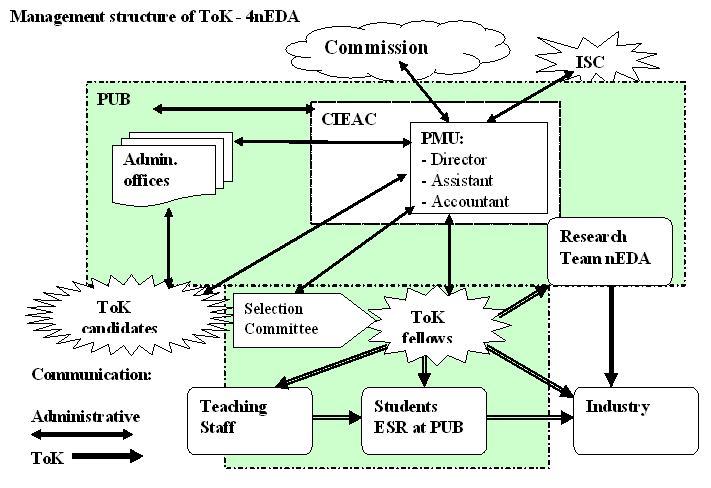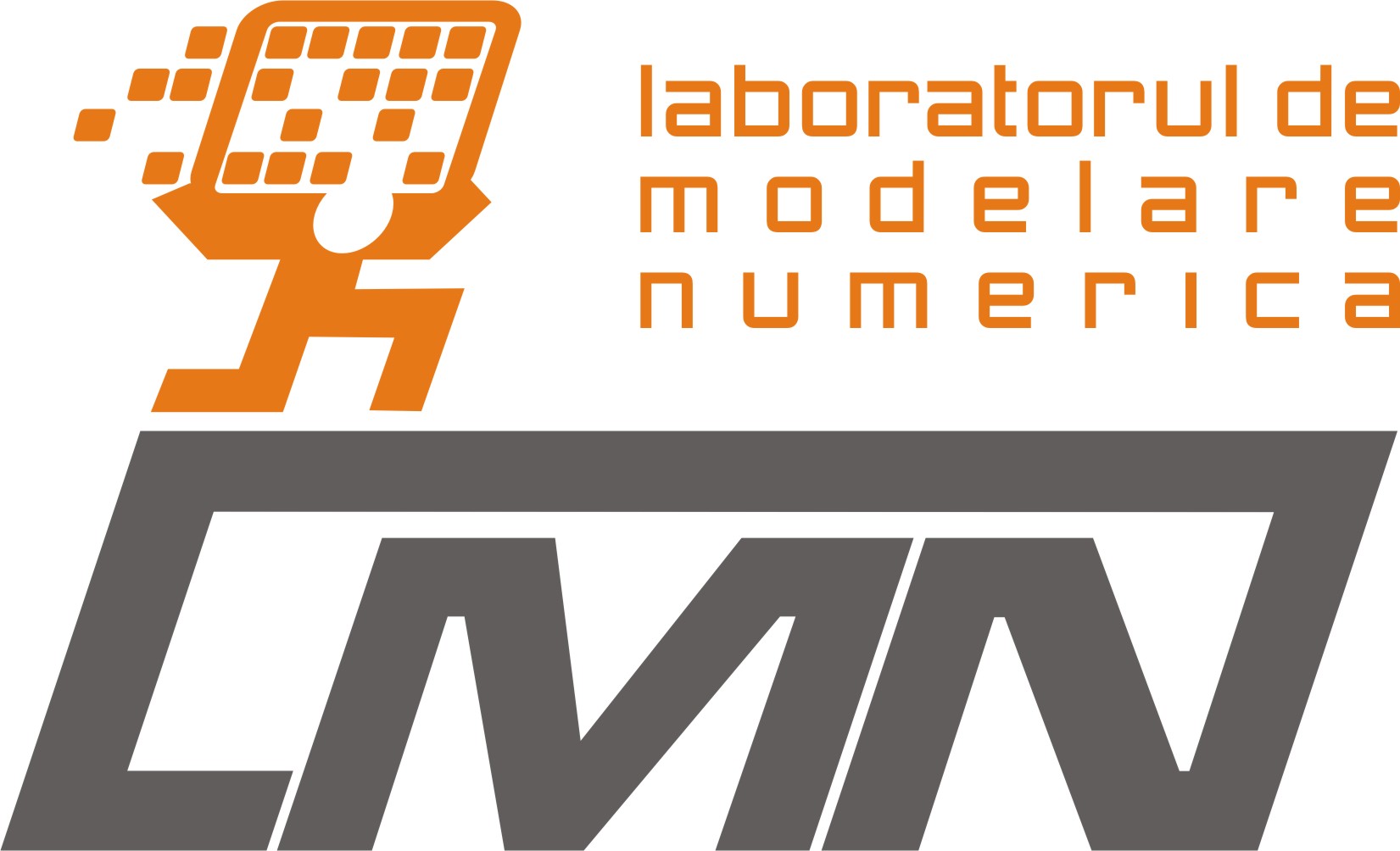![]()
The ToK activity will be organised and co-ordinated by a management team within the Computer Aided Electrical Engineering Centre (CIEAC) of "Politehnica" University of Bucharest.
In order to take care of all the day-to-day practical arrangements required for a successful run, a Project Management Unit (PMU) will be set-up within PUB-CIEAC Research Centre. This executive team comprises the Project Director (co-ordinator), an assistant manager (in charge with training, dissemination and communication activities) and a representative of the PUB financial department (project chef accountant). The PMU will be in charge of any matters related to financial, administrative and secretarial tasks including preparation of the periodic reports to the Commission (such as progress reports, cost statements and audit certificates), ToK activity co-ordination, organisation of training, travels, meetings, day-to-day business, as well as the financial management and control of the fellowship (including audit certification). They will be in charge with procedures for decision making regarding possible re-adjustments of the initial budget and the recruitment re-scheduling.
This implementation team will co-operate with ToK fellows, research groups, and with several PUB administrative offices, as it is illustrated in the following chart.
Selection
Committee
will appoint the qualified researchers, using the appropriate recruitment
strategy described in below. The hired ToK fellows will submit an activity
report to PMU each month.

The project coordinator will provide the overall policy and direction of the project from both administrative and scientific perspectives, including risk management and suitable contingency plan. He will chair the ISC - International Steering Committee (the same body used to monitor activity of all nEDA projects).
Project management unit will take care about protecting, publishing and utilising the generated knowledge. A detailed dissemination and exploitation plan of the research results will be set-up during the first semester of the project. The co-ordinator will act as a knowledge manager, aiming to maximize the industry impact during and after the project. A dedicated web site, with both public and private areas, will be a useful tool, both for project management and for stimulating dissemination and use of newly created knowledge. It will be used to advertise the Marie Curie action for the general public together with other mass media.
In order to exploit the project achievements, the results of the proposed project will be disseminated using several methods, aiming to raise public awareness of the EST programme and of the FP6 and FP7 Marie Curie actions in general. The scientific and technical results will be disseminated through the traditional channels used by the academic community, such as publications in prestigious journals and communication to first class conferences. Each published paper as well as internal reports or manual realised within ToK-4nEDA project will acknowledge the financial support of EU. In order to disseminate their knowledge and exploit the research results, the researchers will be encouraged to use IPR-Helpdesk and Gate2Growth.
We expect an important impact of the 4nEDA web site. Banners and recruitment adverts will be posted in PUB and abroad at our European partners, during the international conferences, seminars and workshops. Professional organisations such as Politehnica Alumni, AGIR, Ad-Astra, Tempus Alumni, and IEEE Romania Section will be also used in publicity.
The publicity will be treated as an important component of the project aiming to bridge the gap between the European dimension of science and the national public. In this way, citizens are encouraged to better understand the beneficial impact of science and, in particular, of HPC, CSE, SCEE and nanotechnologies on their everyday lives.
As it was mentioned just from beginning, the strategic goal of the proposed TOK-4nEDA project is to increase the contribution of the host in strengthening of the scientific and technological bases of industry, in order to increase the international competitiveness of European knowledge-based economy. This goal can not be reached without an appropriate attitude about Intellectual Property Rights (IPR). This is why the host organisation has an active patenting and licensing policy. IPR will be managed using the FP6 basic principles and the European laws in this domain. Ownership resides, as will be stipulated in the signed agreements between ToK fellows and PUB, with the person generating the knowledge. All project participants will be encouraged to keep record of knowledge created during the project (who invented/discovered, what and when), to protect it and to inform PMU about them and their level of confidentiality. A detailed plan for IPR management, as a part of dissemination and exploitation plan will be set-up by the PMU, during the preparatory stage of the project (www.ipr-helpdesk.org considers it helpful, even it is not imposed by contract). The researchers involved in nEDA project have access to the confidential data and know-how coming from our industrial partners. PMU is in charge to take all necessary measures to preserve the confidentiality. Since the Grid is extended outside organisation, enhancement of computer and data security is an important concern of the project.
The PMU will help ToK fellows to disseminate and to exploit in a professional manner all new knowledge, created during the project. They will be informed that, according to the contract, it is obligatory to provide any knowledge, which "could be industrially or commercially applicable" with "adequate and effective" protection through the different intellectual property rights. When the contractor will grant or transfer the knowledge ownership to the third parties, the Commission will be informed about planned transfer, asking for an agreement.
The project coordinator will be the exploitation manager for the project, who will co-ordinate all aspects that have an influence on the exploitation of the results. He will co-ordinate all exploitation related issues (patents, licenses, diffusion activities etc.). The exploitation manager will also be in charge of coordinating possible negotiations concerning exploitation issues with third parties. ToK-4nEDA will produce added value for PUB, due mainly to the profound change in relation with IPR issues, and therefore the link with industry.
Recruitment strategy of ToK-4nEDA fellows is based on the principles of The Code of Conduct for the Recruitment of Researchers (2005/251/EC): transparency, openness, correctness, systematic apply of the equal opportunity principle and recognition of mobility experience. Applicants should have an academic background adequate in Computer or Computational Science or Engineering. It is important for them to have knowledge in mathematics and experience in solving problems with computers. Experience in nanoelectronics or EDA is not required. Professional work experience in related fields will be considered merit, and they should fulfil the conditions to be an eligible researcher for ToK fellowship. These requirements will be included in the adverts together with an attractive description of the ToK-4nEDA project including a description of the working conditions and entitlements, including career development prospects. The advertising campaign will start as soon as possible, in the first month of the project.
The selection of ToK fellows will be namely on the basis of: aptitude to carry out individual projects, potential for excellence, scientific quality, impact and the benefit of the proposed research to the individual fellow's research career. The internationally comparable assessment procedure based on applications and interviews will ensure transparency, impartiality, and equal supportive treatment of all applicants. The principle of equal opportunities will be applied, in particular between men and women. At same qualification, women will be preferred. The selection committee will comprise 50% women. The best practice will be applied to inform and convince talented people, especial women about the advantages to do research in Romana. The ToK positions will be advertised openly using inexpensive electronic communication means, such as web and e-mail vacancy databases (http://improving.cordis.lu/mc, Pan-European Researcher's Mobility Portal: europe.eu.int/eracareers, or mailing lists of kind www.job) and the web-sites of our JEN partners. The National Contact Points NCPs will be also advertised as well as Informal of Liaison Offices (www.iglortd.org). More extensive but targeted methods such as letters, posters and visits to our partner universities aiming to personal discussion with potential candidates are also planned. Since the quality of the project outcome is dictated mainly by the value of the appointed fellows, all active "head-hunting" techniques will be intensively used in the recruitment. The strategy to find the appropriate fellows, qualified researchers for the job will be implemented with the support of our international partners. They encouraged us and promised the full support in this respect.
